Sandra, young woman of today (Léa Seydoux), raises her daughter alone and takes care of her father, Georg (Pascal Gregory) who was a brilliant philosophy teacher. Now he forgets, declines, loses his footing. His memory is a parchment in which remain fragments of his thoughts, his emotions, of who he was. While Sandra, powerless, witnesses this degradation, she stumbles upon one of her old friends, Clément (Melvil Poupaud). Life is there, in this contrary movement where while the beloved father disappears, a new love is born.
Léa Seydoux in “A Beautiful Morning” by Mia Hansen-Love
Diamond Films
Is it this double movement of the end of a man and the beginning of a…
Sandra, young woman of today (Léa Seydoux), raises her daughter alone and takes care of her father, Georg (Pascal Gregory) who was a brilliant philosophy teacher. Now he forgets, declines, loses his footing. His memory is a parchment in which remain fragments of his thoughts, his emotions, of who he was. While Sandra, powerless, witnesses this degradation, she stumbles upon one of her old friends, Clément (Melvil Poupaud). Life is there, in this contrary movement where while the beloved father disappears, a new love is born.

Léa Seydoux in “A Beautiful Morning” by Mia Hansen-Love
Diamond Films
Is it this double movement of the end of a man and the beginning of a love which, at the beginning, helped you to build the film?
I don’t really realize it, but what is certain is that when I was really living the last scene of the film which is both painful and happy since the horizon opens, I saw the possibility of a story. My films seek to speak truthfully about life and if I only saw the hopeless side of things, I couldn’t make them. It’s when I see a contradiction, or a variety, or a richness but also light that the desire is born.

Melvil Poupaud, Camille Leban Martins and Léa Seydoux.
Diamond Films
The story of “Un beau matin” is very personal to you. How did you find the right distance?
This mixture of autobiography and fiction is indistinguishable, and it remains a bit mysterious for me. From the day I started writing films, I fed on people I had met, not necessarily things I had experienced, but presences. It’s not always my own experience because “The Father of My Children” Where “All is forgiven” don’t tell my “experience”, and are inspired by people I sometimes barely knew. But from the moment I start writing a screenplay, there’s really a confusion that takes place between life and fiction, and that’s what allows me to write. I don’t need to artificially create a distance. From the moment it becomes a story, it’s no longer me. And yet, it feeds on emotions and feelings that I experienced. Basically, it’s the fact of writing that gives the right distance.
“From the moment I start writing a screenplay, there is really a confusion that takes place between life and fiction”
Was making the film a way to console you for the disappearance of your father?
Yes, a huge consolation. From my first film, I felt this form of consolation, but here it is literal. Sometimes, the link with my own life is more secret, more underground, but this time, I approached personal things head-on, without transforming them so much.
You said Pascal Greggory looked like your father. When writing the film, were you thinking of your father or your actor?
Both, I believe. I drew on my memories, on an experience that was still very fresh since when I was writing the film, my father was still alive, but I knew he wasn’t going to be there for long… And at the same time, I was thinking of Pascal (Greggory). I had recorded my father who was a philosophy teacher and when I was writing the script, I listened to this recording, hours and hours of conversation. Of course, no scene in the film is a literal reflection of these recordings. These are visiting hours that would be boring. I went to find the essence of our exchanges. That’s fiction… Giving rhythm to chaos. Go find what you feel and transmit a truth.
Did you record it to remember it?
Because he was disappearing and I wanted to hold him back, yes. I recorded it for two years, I kept everything. I was trying to get him to talk about his childhood, to get him to say things he wouldn’t be able to say afterwards, I knew that these were the last conversations we had… He says very beautiful, very poetic things that reveal also what he was.
Did you have Pascal Greggory listen to them?
I didn’t want Pascal to be in a performance, but since this disease is very special, yes, I had him listen to two short bits of recording and he understood right away. After that happens on the set. He remained in great humility, almost a form of abnegation in the face of this father. He melted into the character. Besides, the role says a lot about the illness, but it also says a lot about who Georg was. Her sweetness, her melancholy, her modesty.
Did you ask Léa Seydoux to capture gestures or attitudes that are personal to you?
No, she’s very intuitive and I never asked her to be like me. Actors who play characters very close to their directors imbibe anyway. But I would not have wanted her to imitate me, on the contrary, I prefer that through her, it becomes another story, and that of the spectators eventually. Nothing pleases me more than people who at the end of the film say to me: this is my story.
Sandra, like her father, lives in very small apartments… Is this a way of showing that the intellectual world is not necessarily a bourgeois world?
Yes, I who grew up between two parents who were teachers, I know that they corresponded in no way to bourgeois according to the common sense that we give to the word. It was very important that the apartments be faithful to the cramped conditions that I experienced. Yes, they are intellectuals, they have good taste, but they don’t live in huge apartments. They belong to a middle social class and what happens in the film, the wandering of this father for whom we are looking for an Ehpad is linked to that.
There is the importance of books too…
What remains of the people who have disappeared? The books, even if they have only a spiritual or symbolic value, are the metaphor of a life devoted to thought and to a quest for truth.
“One Fine Morning” by Mia Hansen Love. With Léa Seydoux, Pascal Greggory, Melvil Poupaud, Nicole Garcia. Duration: 1 h 52. In theaters Wednesday, October 5.
